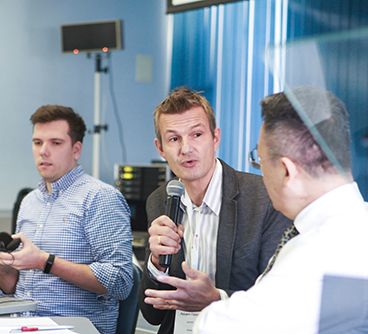INSCI’2018: All power to the users?
December 01, 2018
 St Petersburg University has hosted the ‘5th International Conference on Internet Science — 2018’ (INSCI’2018).
St Petersburg University has hosted the ‘5th International Conference on Internet Science — 2018’ (INSCI’2018).
The INSCI conference is one of the largest scientific events in the field of interdisciplinary Internet studies. The interdisciplinary principle of the conference contributes to the achievement of its main goal: to provide a platform for an open and productive dialogue among representatives of all areas that access the Internet as a social and engineering system.
The 1st International Conference on Internet Science was held in 2013 in Brussels. Each year, INSCI takes place in different countries. For example, last year it was held in Thessaloniki (Greece). Next year, the conference will be hosted in France.
Professor Anatolii Puiu, the Director of the Graduate School of Journalism and Mass Communication of St Petersburg University, expressed his gratitude to foreign guests for their visit. He also thanked the organising committee of the conference for the decision to hold it in St Petersburg.
INSCI’2018 was opened by a plenary panel discussion on user rights and the possibilities of social networks in different regions of the world. It was moderated by SPbU professor Svetlana Bodrunova. People participating in the discussion were: Arseniy Ashomko, VKontakte Media Product Development Manager; Dr Christian Voigt, Head of the Technology and Knowledge Unit of the Centre for Social Innovations in Austria; Jack Pen, a founder of the non-commercial project The Poem for You from Beijing; Asbjörn Folstadd, a senior researcher of the Norwegian research organisation SINTEF; and Anastasiia Folts, an associate professor of Moscow State University.
One of the issues that the experts came up with was whether the possibility of participating in a decision-making process via the Internet is one of the essential human rights. Asbjørn Følstad linked this user’s prerogative to the democratic process in developed countries. He also noted that the level of users’ involvement depends directly on the level of technology development. Jack Pan argued that the majority on the Internet can influence the political process. He cited Chinese wisdom to illustrate his point of view, «Beware of rumours — the law does not punish the majority.»
Svetlana Bodrunova posed a question to the experts: do they think that the statement that Internet research is always closely connected with political research is right? Anastasiia Folts did not agree with this statement, citing as an example an Indian social network for dating, which provoked a conflict between the young people who use it and their parents.
The technological aspect of Network development was also touched upon during the panel discussion. Christian Voigt emphasised that today the algorithm for implementing user rights is changing and this directly correlates with increased responsibility. In his opinion, the following issue becomes relevant: what functions in communication do we delegate to machines and how do we do it?
Arseniy Ashomko confessed that the issue of technology for him is a philosophical one: any technological invention, from the wheel to the Internet, is associated not only with progress, but with risks as well. Therefore, the focus is increasingly on the issue of regulation, which, fortunately, does not yet affect the development stage itself.
As part of the key speakers’ speeches at the conference, Elena Sherstoboeva, an associate professor of the Higher School of Economics, presented a report on Internet regulation in Russia and international law in the field of freedom of expression. The speaker shared the opinion that today we are witnessing the process of de-universalising the concept of «freedom of speech». It begins to be interpreted differently in different countries and thereby reduces the role of international law in this area.
An independent scientist Nataliia Konradova presented the results of a historical study of how the Internet had appeared in the Soviet Union. She told the audience a lot of interesting facts about: the organisation of the San Francisco-Moscow video conferencing, which was the first in the history of the USSR; the emergence of the first Soviet Internet provider SovAm Teleport; and the connection of these events with the world-famous Esalen Institute. The founders of this institute were followers of the «Human Potential Movement» — the ideas of the English writer and philosopher Aldous Huxley.
Katharina Esau from the University of Düsseldorf spoke about the concept of «listening» in political online discussions. According to her, the users participating in online discussions and «listening» to other users, respond solely on the topic, reasonably and respectfully.
Cornelius Puschmann from the Hans-Bredow-Institut, Germany, spoke about the results of a study that involved measuring algorithms, through which personal search queries and news recommendations are formed. Olessia Koltsova, the head of the Internet Studies Laboratory of the Higher School of Economics in St Petersburg, presented a key report on sociological research on the Internet.
As part of INSCI’2018, there was a series of educational master classes and seminars. Elena Sherstoboeva conducted a copywriting tutorial on the Internet. Aleksey Maksimov talked about webometrics and web analytics. Also, on the final day of the conference, there were four interdisciplinary workshops. The chat bot workshop was conducted by the Norwegian researcher Asbjørn Følstad. Svetlana Bodrunova and Olessia Koltsova shared practical guidelines on finding socially problematic content. A French scientist Harry Halpen conducted a seminar on distribution technologies — blockchain, encryption and personal data — in the aspect of decentralised management. Polina Kolozaridi and Leonid Iuldashev, coordinators of the Club of Internet and Society Fans, shared their knowledge about narratives in online media.
No comments yet. Be the first!


